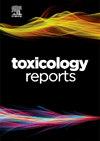α-ketoglutarate ameliorates colitis through modulation of inflammation, ER stress, and apoptosis
Q1 Environmental Science
引用次数: 0
Abstract
Colitis is an inflammatory disorder of the gastrointestinal tract. A widely consumed dietary nutrient, α-ketoglutarate (α-KG) is known to play a crucial role in cellular metabolism and provide protection to intestinal epithelium under various pathophysiological conditions. In this study, 2,4,6-trinitrobenzenesulfonic acid (TNBS) was used to induce colitis in Wistar rats. After 36 hours of TNBS administration, the rats were orally treated with a solution of α-KG at 1 g/kg body weight for 5 days. Development of colitis was confirmed by observable physical symptoms of repeated loose blood-mixed stool, apathy for food and weight loss. Macroscopic inspection revealed an inflamed colonic surface with ulcerations. Histopathological observations included alterations in crypts-structure and disruption in both epithelial and mucosal layers of colon in colitis induced rats. Colitis resulted in elevated levels of pro-inflammatory cytokines, ER stress-mediated cell death and intrinsic apoptosis pathway. The ameliorative effects of α-KG against TNBS-mediated toxicity were confirmed through molecular technics and docking analysis. Additionally, there were no instances of toxicity of α-KG. Therefore, α-KG can be considered as a valuable therapeutic agent for further comprehensive research.
α-酮戊二酸通过调节炎症、内质网络应激和细胞凋亡来改善结肠炎。
结肠炎是一种胃肠道炎症性疾病。众所周知,α-酮戊二酸(α-KG)是一种广泛摄入的膳食营养素,在细胞代谢中发挥着重要作用,并在各种病理生理条件下保护肠上皮细胞。本研究采用 2,4,6-三硝基苯磺酸(TNBS)诱导 Wistar 大鼠患结肠炎。给药 36 小时后,大鼠口服每公斤体重 1 克的α-KG 溶液,连续 5 天。通过观察大鼠反复排出混有血液的稀便、厌食和体重减轻等身体症状,证实大鼠患上了结肠炎。宏观检查发现结肠表面发炎并伴有溃疡。组织病理学观察包括结肠炎诱导大鼠结肠隐窝结构的改变以及结肠上皮和粘膜层的破坏。结肠炎导致促炎细胞因子水平升高、ER 应激介导的细胞死亡和内在凋亡途径。通过分子技术和对接分析,证实了 α-KG 对 TNBS 介导的毒性有改善作用。此外,α-KG 没有毒性。因此,α-KG 可被视为一种有价值的治疗药物,有待进一步的综合研究。
本文章由计算机程序翻译,如有差异,请以英文原文为准。
求助全文
约1分钟内获得全文
求助全文
来源期刊

Toxicology Reports
Environmental Science-Health, Toxicology and Mutagenesis
CiteScore
7.60
自引率
0.00%
发文量
228
审稿时长
11 weeks
 求助内容:
求助内容: 应助结果提醒方式:
应助结果提醒方式:


